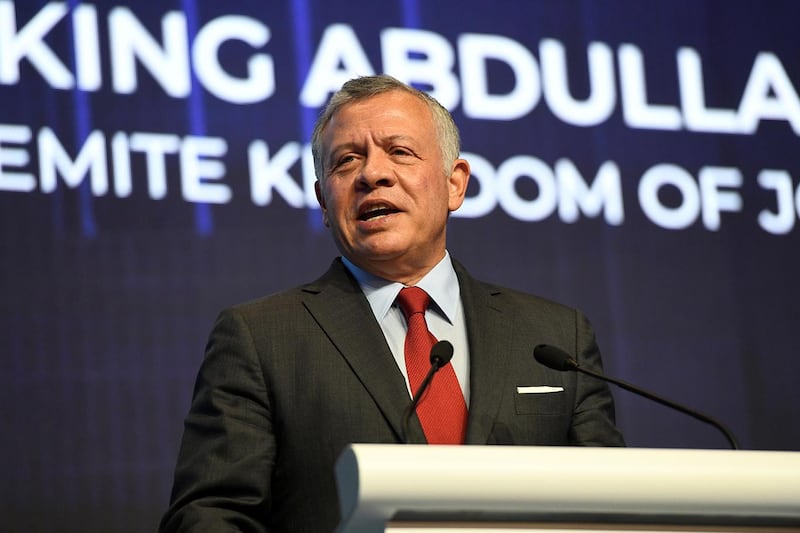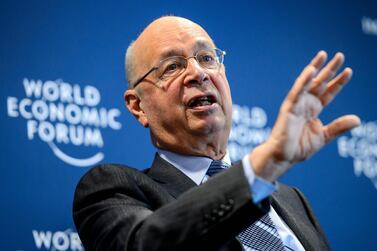The Covid-19 crisis can be an opportunity for a more inclusive global recovery if governments and companies “act decisively and act together”, Jordan’s King Abdullah II told a World Economic Forum summit on sustainable development on Monday.
The Sustainable Development Impact Summit – being held online – opened with remarks by video from the king followed by a panel discussion featuring Ivan Duque, the President of Colombia.
King Abdullah said that “real, sustainable development … that is truly felt by all peoples” is needed more than ever right now as the world grapples with the pandemic and its humanitarian and economic ramifications.
Global Opening Moment with @alainbejjani (@MajidAlFuttaim), @IvanDuque, @GraceAForrest, @rmasrmas, Anushka Ratnayake (@myagrofarms), Professor Klaus Schwab, @cnbcKaren, @cnbc https://t.co/ZveW2SI3Qr
— World Economic Forum (@wef) September 21, 2020
“This crisis should also be seen as an opportunity … if we act decisively and act together,” he said. “We must begin by rethinking our entire global system to become more integrated, resilient and just.” He warned that the most vulnerable communities should not be left behind.
He called for “mutually beneficial bilateral, trilateral and regional” partnerships to create of a global safety net to tackle poverty, unemployment and food security.
As a result of the pandemic, King Abdullah said that Jordan has been investing more into agriculture, ICT, health care and pharmaceuticals, in partnership with the private sector “to help ourselves and others”.
He said Jordan is ready to be a regional hub and “launch pad” that facilitates international efforts to respond to challenges ahead, which include the climate crisis, poverty, hunger, unemployment and social economic inequalities.
King Abdullah said that there should be a “reglobalisation” for countries to balance self-reliance and inter-dependence and which leads to technological and industrial progress which is sustainable.
"I urge you to look at the opportunities to seize and ways to collaborate to build a truly inclusive global system that leaves no one behind."
Mr Duque discussed Colombia’s efforts in its energy transition towards relying more on renewables.
Protecting forest areas and a shift to clean transportation including more electric vehicles are also priorities for his government as it pursues a circular economy policy and the development of what he called “biodiverse-cities”.
Colombia is planning to plant 180 million trees between now and August 2022. "We need cities to contribute in waste-to-energy programmes," he said.
The Forum says that the havoc wreaked on societies and economies has dealt a major setback to achieving the 2030 Agenda and the Paris Agreement on climate change.
Klaus Schwab, founder and executive chairman at World Economic Forum, which holds its annual meeting in Davos, Switzerland, has talked about a "Great Reset" – which is his and the Forum's call for a new kind of capitalism.
His new book argues that the pandemic has revealed a great and collective desire for change that governments and companies around the world must urgently address or risk “violent shocks”, such as revolutions and conflicts across countries.
At the start of Monday's discussion Professor Schwab recalled the five key areas which the meeting will focus on.
“First, shared prosperity, second catalysing co-operation, co-operation is so important particularly public-private co-operation today to address all the issue which we face," he said.
"Better business, what can we do in order to implement the stakeholder concept, four, harnessing technology. We have all the technologies of the fourth industrial revolution, how can we use them best in terms of providing a human-centred approach to technological development. Finally, maybe most urgently at the moment, a liveable planet.”
Also part of the discussion on Monday were Alain Bejjani, chief executive of UAE leisure and property company Majid Al Futtaim Holding, Rebecca Masisak, chief executive of non-profit TechSoup Global, Anushka Ratnayake, founder of myAgro, and Grace Forrest of human rights organisation Walk Free.
About 3,000 people are expected to participate in the summit online.







